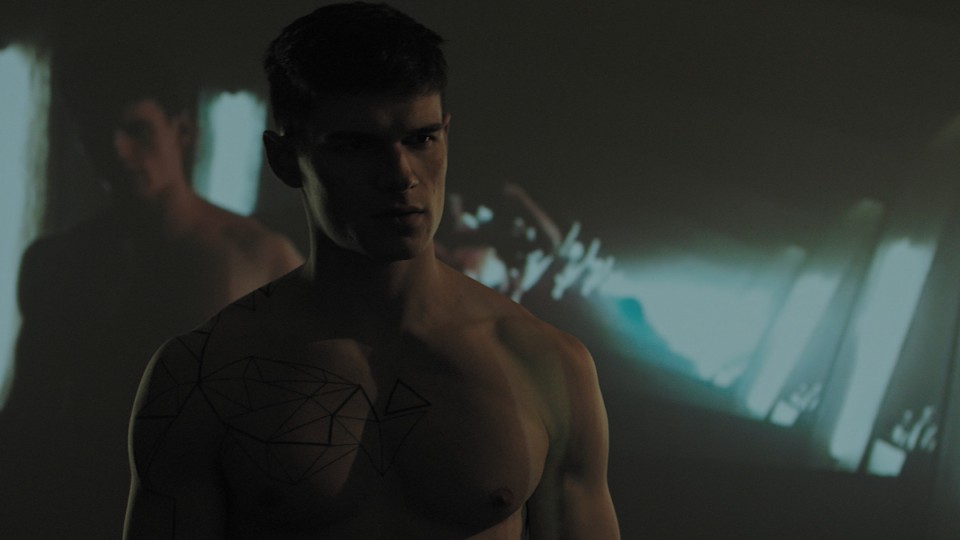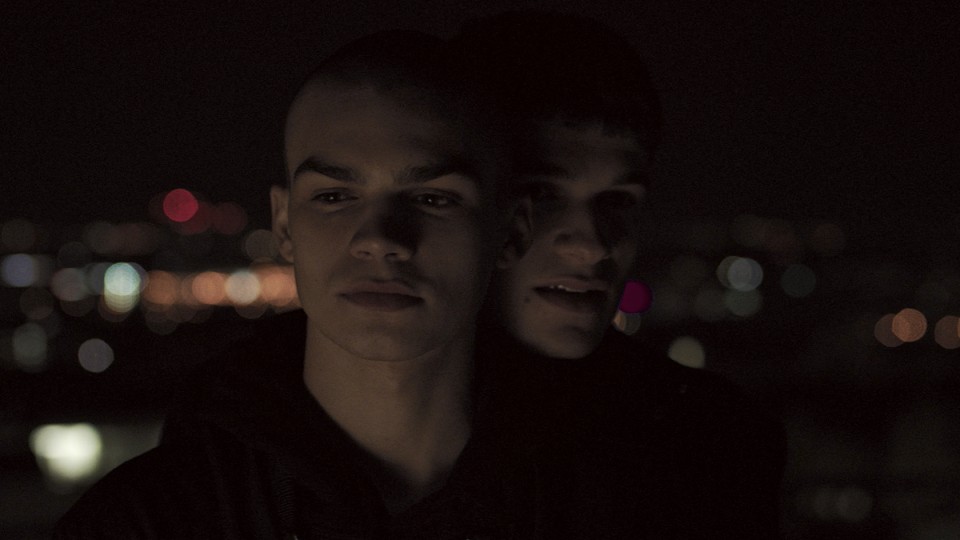For his debut feature film Gregor Schmidinger has created a NEVRLAND between being a child and being grown-up, between reality and fantasy, between the genuine and the staged self. He sends
his protagonists Jakob and Kristjan, offspring of Generation Y, into this world on a terrifying journey from the surface to
their individual depths. A conversation with Gregor Schmidinger (director) and Ulrich Gehmacher (producer).
You studied in the USA for a long time. What did you bring back with you that you have now been able to utilize in your first
feature film?
GREGOR SCHMIDINGER: First I studied digital television in Salzburg, getting a very technical background with regard to production and broadcasting
technique in television. As part of this course there was an exchange semester in the USA, where my first short film screenplay
was developed in a scriptwriting class, and I discovered that the creative side of filmmaking appealed to me more. I then
started studying at UCLA, where you can attend courses online as well. I spent three very intensive years like that: I had
to produce a feature film screenplay every semester, and the deadlines were modelled on classic Hollywood contracts, with
12 weeks for the first draft. I certainly returned from the USA with a different attitude towards film. UCLA is very strongly
influenced by Hollywood, i.e. the approach is firmly anchored in the perspective of the audience. I learned on the one hand
to remain true to my story but at the same time to consider very thoroughly how I could make it more accessible to a broad
audience. And since the workload and time pressure were enormous, I also learnt to write even when I didn't feel particularly
inspired or have any brilliant ideas.
In order to make a first feature film, a filmmaker also needs a producer: how did the script for NEVRLAND attract your attention?
ULI GEHMACHER: I was very impressed by Gregor's short films, and also by the presence he created for his films in social media. I found
the script for NEVRLAND captivating the first time I read it. I immediately had the feeling that I had never read a story
like that before – and I'm speaking here as someone who reads an average of 200 screenplays each year.
How would you summarize what NEVRLAND is about?
GREGOR SCHMIDINGER: I like to describe it as a deeply psychological coming-of-age drama. It's about growing up, not so much with regard to the
environment but much more about what happens inside a young person, about coming to terms with the past. The focus is on a
17-year-old boy, Jakob, who suffers from severe panic attacks, which is one reason he likes to take refuge in the Internet.
That’s where he meets a 26-year-old man, on a cam chat site. Jakob’s father isn't emotionally accessible, and the death of
the only person he can relate to emotionally – his grandfather – prompts him to take a huge step and arrange to meet his Internet
friend in real life. It's the beginning of a night during which, layer by layer, apparent reality is deconstructed, and we
travel with him into his innermost being, which is also where the cause of his panic attacks is to be found.
The title establishes an association with Peter Pan's Neverland. Is the yearning to remain a child another one of the themes?
GREGOR SCHMIDINGER: "Nevrland" represents to me an imaginary world where a person takes refuge in order to avoid having to grow up. On the other
hand, my protagonist is confronted there by the very things he needs to face in order to grow up. And we also raise the questions:
from what point are you grown-up? What does growing up really mean? I'm not completely certain about any of this myself.
In one video you describe yourself as part of Generation Y/Generation Tumblr. How would you characterize this generation?
Which subjects and issues engage it?
GREGOR SCHMIDINGER: It's a generation which is marked by the Internet and its mechanisms. The explanation for the spelling of NEVRLAND is that
round about the year 2000 online services often omitted the "e", as with Tumblr for example. You're living in a world which
is supposed to be reality, in the sense of Instagram. You present yourself and stage your appearances – and you are aware
of that, because you're doing it yourself – but at the same time you fall into the trap of assuming that when you deal with
other people, that's reality. The discrepancy between reality and fantasy is a huge subject for this generation. And the challenge
is to find out for yourself what is substance and what is just surface.
When I read the screenplay two fundamental thematic strands struck me: homosexuality and overcoming fear. What appealed to
you, as the producer, about the task of striking a chord with a potential audience with this film?
ULI GEHMACHER: For me, NEVRLAND is definitely a romantic story. I felt as though I were being transported back to my youth, as a 17-year-old.
I belong to a generation that fell in love with posters on the bedroom wall – in my case, Madonna. What captivated me emotionally
was the fact that here a kind of imaginary friend emerged, the kind we all long for; the figure suddenly emerges, touches
and seduces us. The second factor which appealed to me a lot is Jakob’s open attitude towards and way of dealing with sexuality.
When one of them asks the other: "What is it you really want?", the other replies: "I don't dare kiss you." It exposes the
fact that for somebody who is completely crammed full with sex from the Internet, this first kiss is endowed with a far greater
significance than the first sex. Spiritual closeness becomes a great challenge, whether we are talking here about heterosexual
or homosexual relationships. Gregor also describes his screenplay as a post-gay drama. The sexual orientation strikes me as
completely interchangeable.
You have mentioned that the subconscious plays a large role in this film. It also deals with plunging into other states of
consciousness. How is it possible to imagine these moments visually?
GREGOR SCHMIDINGER: I think I'm someone who writes in a very visual way. In Jo Molitoris I had a cameraman who has amassed huge experience with
music videos and advertisements. After four weeks of filming I had the impression we had captured sequences which suggested
our budget was 10 times higher than it actually was. Basically a huge amount of creativity and passion was required in order
to make it possible to experience what Jakob goes through. It was important to me that it's a cinema film, and Jo employed
optical techniques that helped us create a film which only reveals its full potential on the big screen.
ULI GEHMACHER: In addition to our outstanding DOP, we also had a sensational chief lighting engineer, Dominik Danner, who created an incredible
lighting design. Jo used to make music videos in Los Angeles for U2 and the Red Hot Chili Peppers, and since I very much liked
Gregor's "American-style" approach to the screenplay, it struck me that the two of them would make a very interesting team.
As a director, how did you experience the shift from short film to feature film?
GREGOR SCHMIDINGER: It was obvious to me that a different level of intensity and stamina would be required. In terms of working with the actors,
it was very important to me that we should have a week beforehand to develop everything in peace and quiet, because I realized
there wouldn't be any time on the set to try things out. The two main protagonists knew the characters very well. I was there
to make sure that they didn't lose track of the characters, and to make minor corrections. As far as camera style and shot
progression were concerned, it was also extremely important to me to have time in advance. In fact there wasn't any moment
at all when I felt overwhelmed.
ULI GEHMACHER: One thing I valued a great deal about our close collaboration was that Gregor listened to my suggestion. I grew up with the
theatre in my family, and I recommend all young directors to do an internship with a theatre director before making their
first feature film, to follow a production from first reading to opening night, so they can see how a theatre director works
with actors. Gregor did that at the Theater der Jugend, and I think it helped provide a good foundation for him.
It has been revealed that your two first short films have achieved 15 million clicks on YouTube. Promoting your projects on
digital channels seems an obvious step for you. Why is having a strong presence on social media of such importance?
GREGOR SCHMIDINGER: There are two reasons. Firstly, obviously every filmmaker wants his films to be seen. The whole point of marketing is to
tell people that films exist. And it makes sense to practice marketing in places where people's attention is directed: in
social media. For us, that means Facebook and Instagram. But in addition to that, in the case of NEVRLAND there's a link to
the content: Jacob and Kristjan meet over the Internet, and the Internet represents a space for projections. Naturally this
makes digital marketing strategies appropriate. I am one of those people who likes to look outwards, to share things. You
can't really transfer the classical media to social media, because the mechanisms are different. What works best is to record
processes, because then people have the feeling they are part of it. We did this very intensely with NEVRLAND. There are what
are called InstaStories, where short videos are compiled about the stories. Each episode is only accessible for 24 hours,
and we did this very regularly, achieving very high access figures. That creates a personal link, which is very conducive
to word of mouth publicity later. I regard it as a more honest form of communication.
Interview: Karin Schiefer
May 2018
Translation: Charles Osborne










